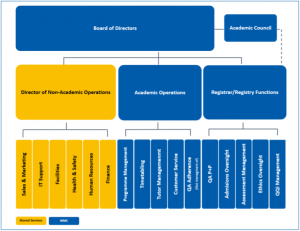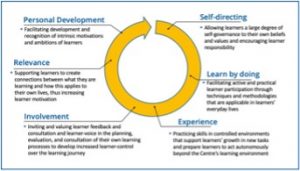Quality Assurance Handbook
The Leading Health & Safety and Business Training Provider in the West of Ireland.

Our QA Manual
Please select the section of the Quality Assurance Manual you wish to view.
Section 2 - Governance & Structures for WMC
Section 3 - Documented Approach to QA
Section 4 - Programmes of Education & Training
Section 5 - Staff Recruitment, Management
Section 6 - Teaching and Learning
Section 7 - Assessment of Learners
Section 8 - Support for Learners
Section 9 - Information & Data Management
Section 10 - Public Information & Communication
Teaching and Learning
6.1 Teaching and Learning Policy
6.1.1 Purpose
This policy document outlines Western Management Centre’s (WMC) approach to teaching and learning to meet the needs and expectations of all stakeholders within an environment that values critical reflection, and personal and professional development for learners and staff.
6.1.2 Policy Statement
WMC operates under a clear governance structure with transparent interrelated processes. Arrangements exist to facilitate informed and independent oversight of all Centre-related matters and the constructive analysis of information gathered through internal and external monitoring and review. Roles and responsibilities of governance are logically defined and supported, and structures are in place to ensure that academic matters are separate from commercial considerations of the Centre.
The teaching and learning experience at WMC is monitored, reviewed, and progressed as part of the Centre’s commitment to continuous improvement of practices. This is facilitated through a process including (but not limited to):
- Learner involvement in Centre and programme practices (for example, the role of Learner Representative)
- Insights gathered through learner and tutor feedback
- Analysis of attendance and course completion rates
- Analysis of assessment results
- Insights gathered through peer relationships, relevant publications, and industry insights
- Staff upskilling and professional development practices
- Programme review and evaluation
The Centre’s monitoring processes inform practices across the relevant academic areas. Separate and clearly defined operational units are responsible to maintain records of all actions and their communication to the relevant Centre stakeholders (see Figure 7).

Figure 7 – Western Management Centre Organisational Chart
6.1.3 Responsibility of
This policy is the responsibility of the Programme Manager and Registrar.
6.1.4 Processes and Procedures
Teaching and Learning Ethos
The teaching ethos at WMC is underpinned by a focus on learner development. The learning that occurs during programmes of study must meet changing social, economic, and labour market needs within the framework of programme learning outcomes.
Lifelong learning incorporates the sum of all learning activities undertaken during a person’s life. Through the ethos of lifelong learning, individuals are encouraged to assume responsibility for the continuous review and development of their knowledge and skills so as to meet challenges posed within an ever-evolving society.
WMC promotes a lifelong learning ethos supported by flexible learning, clear information, support, and advice. The learning ethos at WMC reflects the participation and needs of all WMC stakeholders. The learning opportunities available at WMC lead to qualifications that are respected by all and are achievable in manageable steps. In addition, programmes of study at WMC are relevant to the skill needs of the local economy.
Lifelong learning is particularly concerned with improving access to learning opportunities and encouraging people to take responsibility for their learning journeys. WMC recognises the importance of providing a supportive teaching and learning environment to the Centre’s target learning audiences.
The current learner profile at WMC represents adult learners who are typically engaged in their working careers and who are returning to education with a wide range of work and life experiences which can be used to enrich the overall teaching and learning process.
WMC programmes are aimed at supporting individuals seeking personal, social, and developmental skills to enable them to engage or re-engage in learning. The WMC teaching and learning approach is informed by the:
- Design and development of programmes based on evidenced need
- High quality of programme delivery informed by continuous review and feedback
- Continued focus on supportive and transparent learning experiences
- Development of teaching and training practices that adopt best practice
- Promotion of learner access, completion, progression, and achievement
Teaching and Learning Approach
The programmes of study at WMC are relevant to wider society and the teaching ethos is rooted in relevant theory, society, subject-specific practices, and work life. In addition, the teaching and learning practices at WMC are designed to be relevant to practice, ensuring the Centre’s learners are prepared for the workplace. The Centre focuses on pedagogical issues and the application of teaching materials using appropriate teaching methods.
WMC adopts a methodological approach to the planning and delivery of programmes and programme assessment and to the development of teaching and learning resources. This includes the evaluation of teaching facilities and a close alignment between teaching, learning, and assessment approaches, work contexts, and workplace challenges. Teaching, learning, and assessment strategies are submitted at programme approval submission stage (for more information, see Section 4.1, Programme Development and Approval Policy).
The design and development of programmes and teaching practices within WMC are guided by principles as outlined by Malcom Knowles (1980) to facilitate the learning experience and enable staff and learners to become effective lifelong learners.
Teaching and learning practices are guided by the core principles of adult learning. Figure 8 outlines the principles that WMC applies across teaching and learning practices.

Figure 8 – Core Principles of Adult Learning
National and International Effective Practice
The lifelong learning concept reflects the need for continuous upskilling to meet workforce needs and ensure individuals have the necessary resources/tools to manage their own futures. This concept is reflected across policy strategies concerned with objectives ranging from individual’s sense of social and personal development.
WMC is linked to the broader education and training community and to employers across programme subject areas. Programme development is informed by current practices relevant to the labour force and wider professional networks. Ongoing monitoring and review of statistics to identify trends and assist with benchmarking assist the Centre in comparing award outcome and other programme data with other local, national, and international providers.
Programme specific assessment and content is based on QQI determined standards for knowledge, skill, and competence. These are assessed through the attainment of learning outcomes. When applying standards that ensure award outcomes and other programme data compare with other national and international providers, WMC applies the:
- Grid Level of Indicators for the National Framework of Qualifications (NFQ)
- Standards as indicated in the award specification
- Validated programme specifications (for the award being delivered)
- QQI grading criteria
All learning outcomes are developed within the following guidelines:
- Precise, clear statements indicating what learners are expected to know and understand at the end of a learning process/sequence
- Focus on the learner and learning processes
Teaching Staff
All programmes at WMC are delivered by qualified, subject matter experts in their area of delivery.
WMC is committed to the personal, professional, and pedagogical development of staff. Professional development opportunities are guided by requests from tutors as well as WMC suggested training incentives. Mandatory training is provided, and the Centre also remains abreast of relevant developments to inform proactive training decisions (including developments in new areas of technologies and the use of different training methodologies).
Staff are facilitated in order to attend relevant QQI-specific training and information days. These events ensure staff are aware of current QQI policies, practices, and criteria. The Centre also runs an annual all-day company training and development event. The Centre provides support to all tutors through the provision of a Tutor Handbook which provides tutors with information most relevant to their roles.
Tutors are provided access to module descriptors for each programme of study at WMC. Module descriptors provide all the essential programme specific information (including assessment instruments and delivery materials developed in accordance with relevant QQI guidelines). Any alterations to module descriptor documentation or contents must be approved by the Programme Manager. The use of a standardised brief ensures consistency of provision (including where new tutors join the Centre).
Stay Up To Date
Join Our Mailing List Today - Get The Latest Industry Insights & First Look At The Newest Upcoming Training Courses.
GET IN TOUCH
Our Training Team are on hand to assist you with course enquiries, bookings, or scheduling development opportunities.
CALL US
EMAIL US
VISIT US
Galway Business Park, Dangan,
Galway, Ireland.